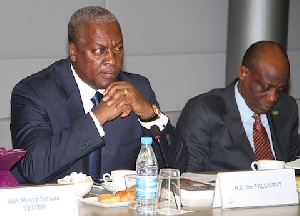 President Mahama with Finance Minister Seth Terkper
President Mahama with Finance Minister Seth Terkper
The latest World Bank Group report, which was released on Thursday, has indicated that developing countries, including Ghana face numerous challenges this year.
The Global Economic Prospects (GEP) report said though developing countries used to be an engine of global growth following the financial crisis, they now face a more difficult economic environment.
As a result, developing countries are now projected to grow by 4.4 percent this year, with a likely rise to 5.2 percent in 2016 and 5.4 percent in 2017.
With an expected liftoff in U.S. interest rates, borrowing will become more expensive for emerging and developing economies in the coming months.
This process is expected to unfold relatively smoothly since the U.S. economic recovery is continuing, and interest rates remain low in other major global economies.
World Bank Group President Jim Yong Kim, however, said: “We’ll do all we can to help low and middle-income countries become more resilient so that they can manage this transition as securely as possible. We believe that countries that invest in people’s education and health, improve the business environment and create jobs through upgrades in infrastructure will emerge much stronger in the years ahead. These kinds of investments will help hundreds of millions of people lift themselves out of poverty.”
The report also revealed that there are considerable risks around such expectation. Just as the initial announcement of U.S. policy normalization caused turmoil in financial markets in 2013 now referred to as the taper tantrum, the U.S. Federal Reserves first interest rate increase or liftoff since the global financial crisis, could ignite market volatility and reduce capital flows to emerging markets by up to 1.8 percentage points of GDP.
Slowly but surely the ground beneath the global economy is shifting.
China has avoided the potholes skillfully for now and is easing to a growth rate of 7.1 percent.
Brazil, with its corruption scandal making news, has been less lucky, dipping into negative growth.
With an expected growth of 7.5 percent this year, India is, for the first time, leading the World Bank’s growth chart of major economies. The main shadow over this moving landscape is of the eventual U.S. liftoff, said Kaushik Basu, World Bank Chief Economist and Senior Vice President.
He said this could dampen capital flows and raise borrowing costs.
The GEP provides a comprehensive analysis of what the liftoff may mean for the developing world.
This would especially hurt emerging markets with greater vulnerabilities and weakening growth prospects.
For commodity-exporting emerging markets that are already struggling to adjust to persistently low commodity prices, or for countries experiencing policy uncertainty, a slowdown in capital flows would add to their policy challenges.
Lower prices for oil and other strategic commodities have intensified the slowdown in developing countries, many of which depend heavily on commodity exports.
While commodity importers are benefiting from lower inflation, fiscal spending pressures, and import costs, low oil prices have so far been slow to spur more economic activity because many countries face persistent shortages of electricity, transport, irrigation and other key infrastructure services; political uncertainty, and severe flooding and drought caused by adverse climate.